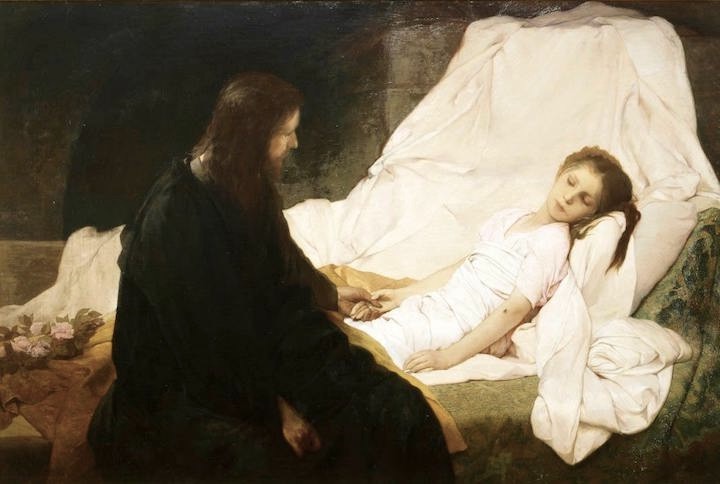It takes a great deal for the Lord to wrestle us from our own hands. Death, it seems, is often the door through which God has to make us walk in order that we rely completely upon Him.
In a touching scene recounted in the synoptic Gospels, the young daughter of Jairus, a ruler of the synagogue, lies dying, and Jairus hurries to seek Christ’s help. (Cf. Matthew 9:18-16; Mark 5:21-43; Luke 8:40-56.) “My little daughter is at the point of death. . . .But come and lay your hands on her, so that she may be made well.” (Mark 5:23)
As Christ starts off with him, relief must have flooded over this good, believing man. And then, the Lord gets delayed. The woman with the hemorrhage steps forward through the crowd and seems to claim the anticipated miracle. Anxiety and despair must have flooded over the waiting father. He seems to have lost his chance. “While Christ was still speaking, there came from the ruler’s house some who said, ‘Your daughter is dead. Why trouble the Teacher any further?’” (Mark 5:35)
Knowingly, Christ turns to Jairus and says, “Do not fear, only believe.” (Mark 5:36)
Only believe.
A similar scenario presents itself to Mary and Martha, whose brother Lazarus languishes and then dies while they wait for Christ to arrive. “Lord, if you had been here, “my brother would not have died.” (John 11:21) Christ allows them to lose the very thing they hoped for, a healing, in order to test their faith in the greater miracle, a resurrection. The process is excruciating.
But Martha proclaims her willingness to believe through the impossible. “Even now, I know that whatever you ask from God, God will give you.” (John 11:22)
Even now.
Both Jairus and Martha have heard the Lord’s “not yet,” seen the blessing pass them by, and been left with death and failure, disappointment and regret. Yet if we stay with them in faith, we realize that Christ delays in order to give the greater gift.
Christ intentionally tarries, delaying his arrival at the place of need, “So when He heard that Lazarus was ill, he stayed two days longer in the place where He was.” (John 11:5) He needs us to trust Him through the apparent loss in order to place ourselves entirely in His own, loving hands. “I am glad for you that I was not there that you may believe.” (John 11:15)

St. Paul relates that in his own sufferings for Christ, he was likewise left for dead in order to rely solely on God. “We were so utterly, unbearably crushed that we despaired of life itself. . .to make us rely not on ourselves but on God who raises the dead.” (2 Cor 1:8)
In today’s pandemic climate, we are faced with a similar challenge in the Church. The silencing of the liturgy, snuffed out around the globe, has left the Church in a deadening slumber. Discouragement is felt palpably among the pastors at the anemic response to the re-opened Mass, the decline of sacramental life, and collections all but dried up. They have no more wine.
The civil strife and violence unleashed around the globe, furthermore, is partly – but undoubtedly – one result of the void of grace created on the earth by the absence of the Holy Sacrifice of the Mass. We removed Christ from our midst, not comprehending how fully the Eucharist was silently emanating power, protection, grace, goodness, forgiveness, and anointing throughout the world. “The world could survive more easily without the sun,” St. Padre Pio once noted, “than survive without the Holy Sacrifice of the Mass.”
But even now, Christ has resurrection in store.
“She is not dead, she is only asleep,” Our Lord declares to those mourning in the room of Jairus’ daughter. (Mark 5:39) “Our friend Lazarus has fallen asleep, but I go to awaken him out of sleep.”(John 11:11)
Just so Christ calls to Peter in Gethsemane, “A few moments ago you boasted that you would die with me, and yet Simon are you sleeping? Now I am pursued to the death . . . and Simon are you sleeping?” (Cf. St. Thomas More, De Tristitia Christi)
Christ comes now to wake us from the slumber of death. He stretches out his hand and commands us to live: “Little girl, I say to you, arise!” (Mark 5:41) “Lazarus, come out!” (John 11:43)
And to His apostles in the Garden, so also to His Church: “Rise! Let us be going; see my betrayer is at hand.” (Mt 26:46)
It is at the threshold of death, when the darkness has enveloped the light and the Garden is overrun by the Enemy, that Christ calls forth the miracle. He allows the death in order to perform His resurrection, if we will fear not and only believe. The hour may be late, the betrayer may be at hand, but the gates of Hell will not prevail. The Church is not dead, she is only asleep. Talitha cumi!
*Image: The Raising of Jairus’ Daughter by Gabriel Max, 1878 [Montreal Museum of Fine Arts]














